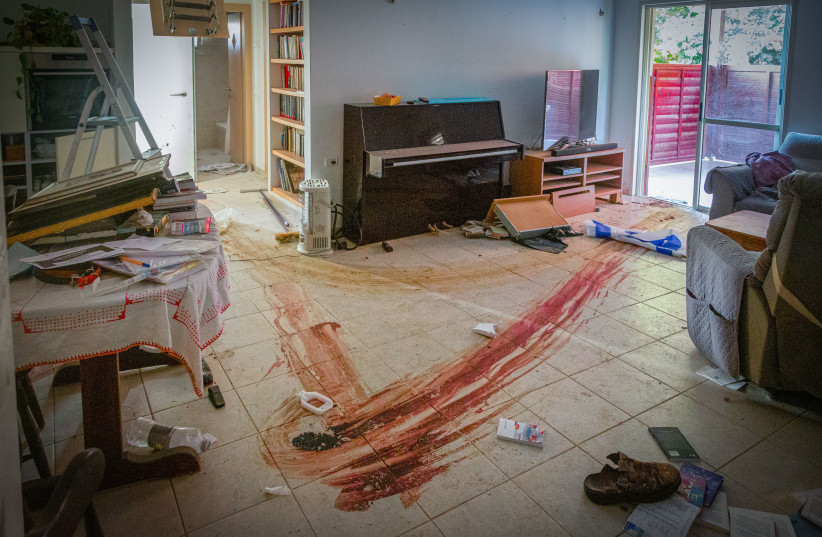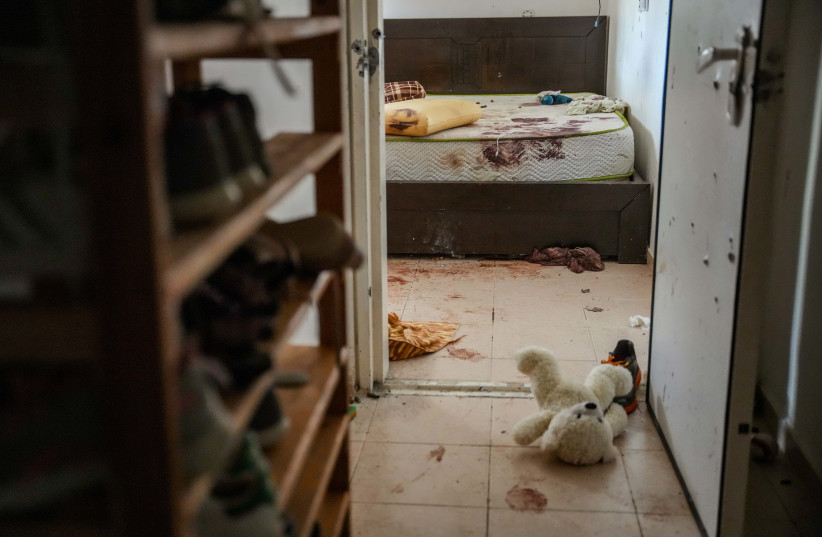“It was often impossible for families to be shown faces – and it seems as if mutilation of these women’s faces was an objective in their murders."

(Warning: this story describes deeply disturbing events and testimonials in graphic detail.)
Expressions of agony survived their deaths, army reservist Shari Mendes said as she described what experts saw when they identified and prepared for the burial the female bodies of Hamas’s October 7 massacre.
“These women arrived with their eyes opened, their mouths in grimaces, their fists clenched,” said Mendes, whose IDF rabbinical unit worked with the bodies, all of which were brought to the IDF's Shura base.
“The soldiers that we dealt with had expressions of agony on their faces still,” said Mendes. "I remember one young woman whose arm was broken in so many places it was difficult for us to lay her arm in the burial shroud, her leg too. In her case the entire left side of her body was shredded, torn apart, most likely by a grenade."
Gender-based violence
She spoke Monday at a sidebar event at the United Nations in New York organized by Israel’s mission to the world body. “Hear Our Voices: Sexual and Gender-Based Violence in the October 7 Hamas terror attack,” was held to highlight stories of Hamas rapes and gender mutilation during the attack, which have been largely swept under the rug by the international community, including the UN itself.
UN Secretary-General Antonio Guterres and UN Women issued condemnations of such acts only last week.

At Monday’s event, Mandes said that many of the bodies of young females arrived at Shura “in bloody shredded rags or just in underwear—and their underwear was often very bloody.”
“Our team commander saw several female soldiers who were shot in the crotch—intimate parts/vagina—or shot in the breast. This seemed to be a systematic genital mutilation of a group of victims,” Mendes said.
In a filmed testimonial played at the event, a survivor said she watched a terrorist that morning cut off a woman’s breasts and then play with them—after he had raped her.
“Our unit has seen bodies that were beheaded or had limbs cut off, mutilated," Mendes said. "One young woman came in with no legs: they had been cut off. We saw several severed heads, one with a large kitchen knife still embedded in the neck.”
“Charred remains arrived and had to be identified and prepared for burial. These bodies were burned beyond recognition, often without arms or legs; they did not resemble anything human,” Mendes said.
“Sometimes we sifted through piles of ash that disintegrated as we touched them. These soldiers were burnt alive at very high temperatures.”
Terrible disfiguring
Among those bodies that were not burned, the heads were often badly disfigured, she described.
“Heads and faces were covered in blood, they were shot in the eyes, face, and skull,” Mendes said.
“It was often impossible for families to be shown faces—and it seems as if mutilation of these women’s faces was an objective in their murders.
For some of them, their "heads were bashed in so badly that their brains were spilling out,” Mendes described.
“Some were shot in the heads so many times at close range that their heads were almost blown off,” she said.
“In some cases, this was done after death, just out of cruelty,” she said, explaining that the absence of blood in the wounds showed that none was left in the body to drain out.
Shura base personnel's grim work
Mendes arrived at Shura on October 8, the day after the Hamas attack in which the terror group killed over 1,200 people including hundreds of soldiers stationed on the southern border.
The scene that greeted her that morning was “unimaginable in scale,” she said.
“Body bags were piled to the ceiling, lining the corridors in every room. Refrigerator trucks were waiting outside, also full.
“Body bags just kept coming in all shapes and sizes. Many were oozing liquids and the floors were wet. The smell of death was already unbearable. It is impossible to overemphasize the number of bodies we were dealing with; the sense of shock and despair,” she said.
Teams have worked to identify bodies at Shura around the clock since that day, Mendes said.
Hamas “did not show these women any honor in life, but it was important to us and our teams, groups of women, that we show them deep love and gentleness as we prepared them for burial.”
Female IDF teams who prepared the bodies for burial are often the last to see the bodies.
“We held them in our hearts even just for a moment, as if they were our daughters, we really loved them.”
As a child of a Holocaust survivor, Mendes said, “I understand the importance of bearing of witness.. I am here to be the voice of those who cannot testify.”
Sheryl Sandberg: We can all agree—nothing justifies rape
Among those who spoke at the event about the importance of condemning the use of rape as an act of war, were former Facebook chief operations officer Sheryl Sandberg and former US secretary of state Hillary Clinton, with the latter sending a taped message.
Sandberg said that rape was recognized as an act of war only 30 years ago, but not enough has been done. “That is why this moment is so critical. We have come so far in establishing that rape is a crime against humanity and we have come so far in believing survivors of sexual assault in so many situations," she said.
“That is why the silence on these war crimes is dangerous. It threatens to undo decades of progress, to undo an entire movement. The world has to decide who to believe. Do we believe the Hamas spokesperson that rape is forbidden and that therefore it could not have possibly happened on October 7?
“Or do we believe the women whose bodies tell us how they spent the last moments of their lives?”
Sandberg said that victims of those rapes could tell their own story if only they had been allowed to live. In their names, the principle that rape should never be used as an act of war should be recognized.
“This truth must be upheld despite the politics of our time. No matter what marches you are attending, what flag you are flying, what religions you are practicing... there is one thing we can all agree on. There is no circumstance that justifies rape.”
Clinton said that as a global community “we must respond to weaponized sexual violence wherever it happens, with absolute condemnation. There can be no justifications and no excuses. Rape as a weapon of war is a crime against humanity.”
“Organizations, governments and individuals who are committed to a better future for women and girls have a responsibility to condemn all violence against women,” she said.
‘It is outrageous that some who claim to stand for justice are closing their eyes and their hearts to the victims of Hamas.”
https://www.jpost.com/israel-news/article-776654?utm_source=ActiveCampaign&utm_medium=email&utm_content=Israel-Hamas+war%3A+IDF+penetrates+heart+of+southern+Gaza&utm_campaign=December+5%2C+2023+2



No comments:
Post a Comment